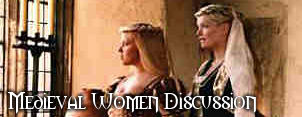 Close Topic Options
Close Topic OptionsMedieval Women - Page 3 of 4
I can see what you're saying Fair - Page 3 - Politics, Business, Civil, History - Posted: 19th Nov, 2011 - 9:44pm
Medieval Women - Page 3
By Brehon Law (ancient Irish law texts still studied today), a Banchomarbae (female heir to a man with no male heirs) could inherit. This also gave her the same legal rights as a male heir and if she married a landless man, she retained the dominant legal role in matters.
Women Medieval
Pity that she could not have the inheritance with or without a male heir, males always seem to get in the way of the progress of the women.
She is unique but what about the female commoner.
International Level: Junior Politician / Political Participation: 71 ![]()
![]()
![]() 7.1%
7.1%
Medieval Women History & Civil Business Politics
One has to remember that in early Celtic society, things were quite matriarchal. Although one's name generally reflected who your father was ("Mac" and "O' " and "ap" literally mean "son of") you were more likely to be asked who your mother was. Some of the Welsh Godforms are even identified by who their mother was. One such example is Mabon ap Modron (literal translation is "young man, son of mother goddess"). Female Godforms were common and revered. Women were the source of life, after all, men couldn't bring forth a new life from their belly!
Women could also be Druids, despite some modern writers beliefs. When the Romans attacked Ynys Mon (the isle of Mona a.k.a Anglesey) the female Druids fought the invasion right alongside the men. The Roman chronicler Tacitus wrote of the battle; "On the coastline, a line of warriors of the opposition was stationed, mainly made up of armed men, amongst them women, with their hair blowing in the wind, while they were carrying torches."
As Christianity took hold in the Celtic Nations, these things began to change and eventually came to the point where women became the "weaker sex".
Page 3 Women Medieval
Thanks for the insight. That reminds me of medieval India and even today they revere their women the same way as life givers but at the same time treat them like crap because they're 'just' women and males have an elevated status.
Christianity does divide the sexes doesn't it but I still see it more liberal than let's say how Islam or Hinduism treats the women. Coming to think about it the addition of religion dictates what a women's position should be.
International Level: Junior Politician / Political Participation: 71 ![]()
![]()
![]() 7.1%
7.1%
Women Medieval
Medieval women may have been given a second spot in society just because their role wasn't seen as important. Even in royalty unless you were the Queen you were a trading card to be settle dis putes or merge kingdoms. There was no love like there is now it was all duty. Most women ended up as mothers and wives to create large armies for the monarchy.
International Level: Politics 101 / Political Participation: 2 ![]()
![]()
![]() 0.2%
0.2%
Medieval Women
The highest position a medieval woman could attain was all based on her education. The more educated she was the more she could be aligned to someone of importance. However, gaining that education was unlikely because of both the cost and priority involved. Mostly royalty were the ones educated and if a rich man (noble) had the money he may not have wanted his wife too smart to take over his wealth.
International Level: Politics 101 / Political Participation: 7 ![]()
![]()
![]() 0.7%
0.7%
Medieval Women - Page 3
That isn't much different from how it is with some men these days and we're not in medieval times so nothing has changed there.
International Level: Junior Politician / Political Participation: 71 ![]()
![]()
![]() 7.1%
7.1%
Medieval Women Politics Business Civil & History - Page 3
I can see what you're saying Fair but at the same time women have come a long way since medieval times. Women are in leadership, heads of countries and all kinds of things they weren't before. Of course there were Queens in the past but that was through birth, now women are elected to be in charge.
International Level: New Activist / Political Participation: 18 ![]()
![]()
![]() 1.8%
1.8%
 TOPIC: Medieval Women
TOPIC: Medieval Women